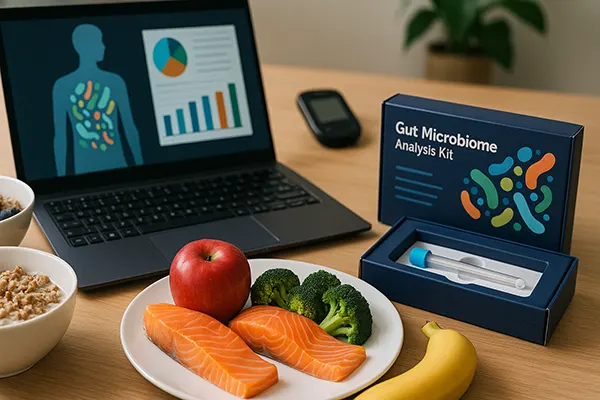
Hyper-Personalised Microbiome Diets: How AI Shapes the Nutrition of the Future
In 2025, nutrition is undergoing a revolution. As science deepens our understanding of the human microbiome, artificial intelligence is becoming a key tool for delivering highly individualised dietary recommendations. These new methods promise not just improved wellness, but targeted interventions for chronic conditions — all based on the unique bacterial profile living in our gut.
The Microbiome as a Nutritional Fingerprint
Each person’s microbiome is as unique as their fingerprint. Composed of trillions of microorganisms, including bacteria, viruses and fungi, the microbiome plays a crucial role in digestion, immune regulation and even mental health. Until recently, general dietary guidelines overlooked these personal microbial variations, often offering standardised solutions for highly individual needs.
Recent studies, including data published in Nature and Cell in late 2024, confirm that individuals react differently to identical foods based on microbiome composition. For example, while one person may experience a glucose spike from eating a banana, another may not. This shift in understanding has made microbiome-driven nutrition not only more accurate but essential for metabolic health.
Thanks to improvements in at-home stool sample analysis, people can now access full sequencing of their gut bacteria. Combined with AI-based predictive models, these tests allow dieticians and health tech companies to generate food plans tailored to optimise microbiome balance, metabolic response and long-term health outcomes.
AI-Powered Personalisation: From Data to Diet
Artificial intelligence is the engine that translates microbiome data into meaningful recommendations. Algorithms process vast datasets — including user-reported symptoms, dietary logs, medical history, and microbial profiles — to create patterns that guide dietary choices. These models grow smarter as more users join, improving predictions over time.
Companies such as ZOE, Viome and DayTwo have led the field by offering AI-powered nutrition programmes that recommend specific foods and supplements. In 2025, they are also incorporating real-time feedback from wearable devices like glucose monitors, ensuring a dynamic and adaptive dietary approach. This integration enables rapid adjustments if biomarkers fall outside optimal ranges.
Such systems are now being tested in hospitals across Europe to manage diabetes, IBS, and inflammatory diseases. Early trials have shown significant improvements in patient outcomes compared to standard dietary guidelines, suggesting that AI-driven microbiome diets may become the gold standard in personalised nutrition therapy.
The Rise of Gut-Friendly Foods and Smart Nutrition Platforms
The food industry has begun to respond to demand for microbiome-optimised products. In early 2025, major supermarkets in the UK and Germany launched dedicated sections for prebiotic and probiotic-rich foods specifically labelled by their microbiome impact. Consumer education around these terms has also improved, increasing public interest in gut health.
AI is also transforming the way we interact with food through smart apps that offer real-time feedback on meal choices. These platforms not only analyse food composition but compare it to the user’s microbiome data to score meals for their gut compatibility. This empowers consumers to make data-driven decisions daily.
Food producers are also collaborating with microbiome researchers to formulate snacks, yoghurts, and drinks with bacterial strains targeted to boost underrepresented gut microbes. The synergy between biotech, food science, and AI is ushering in a new era of nutrition-as-therapy, making it more accessible than ever before.
Limitations and Ethical Considerations
While the promise is vast, challenges remain. One of the main issues is accessibility: microbiome sequencing and AI nutritional programmes remain expensive for the average consumer. There’s also a need for broader clinical validation across ethnicities and age groups to avoid biased recommendations.
Privacy is another key concern. The sensitive nature of microbiome data, which can potentially indicate health status or disease risk, requires strict data protection protocols. Governments and regulators across the EU have begun drafting frameworks to ensure ethical data use in the health tech sector.
Finally, AI models must be transparent in how they derive recommendations. Without clear explanations, users may distrust the advice or fail to understand the rationale behind specific food restrictions or additions. Improving transparency will be essential for the widespread adoption of microbiome-based diets.

What the Future Holds for AI-Based Diets
As AI technologies become more integrated into everyday health practices, microbiome-based diets will likely play a central role in preventive medicine. Instead of treating disease after symptoms arise, these systems aim to maintain optimal microbial balance and immune function from the outset.
Public health programmes in Scandinavian countries are currently exploring microbiome screenings as part of national health checks. If successful, such models may be adopted across the EU and beyond. These initiatives could reduce chronic disease rates by promoting early dietary interventions rooted in microbiome science.
Education will also be key. In 2025, medical schools in the UK and the Netherlands have begun integrating gut health modules into their standard curricula. This marks a shift from reactive to proactive medicine and underscores the growing recognition of the microbiome as a foundation for long-term wellbeing.
The Role of AI in Shaping Global Nutritional Policy
Looking ahead, AI-powered microbiome diets may inform government policy on everything from school meals to elderly care menus. Predictive analytics could forecast nutritional deficiencies in vulnerable populations and propose scalable solutions based on microbial data trends.
Moreover, collaborations between global health organisations and AI startups are expected to grow. The World Health Organization has already announced pilot projects in Brazil and India for microbiome-based community nutrition plans aimed at combating malnutrition with precision interventions.
By combining the latest scientific knowledge, algorithmic processing power, and real-world feedback, AI is not only reshaping personal nutrition but redefining how societies think about food, health, and longevity.